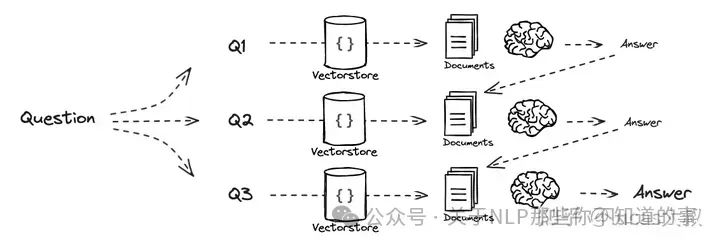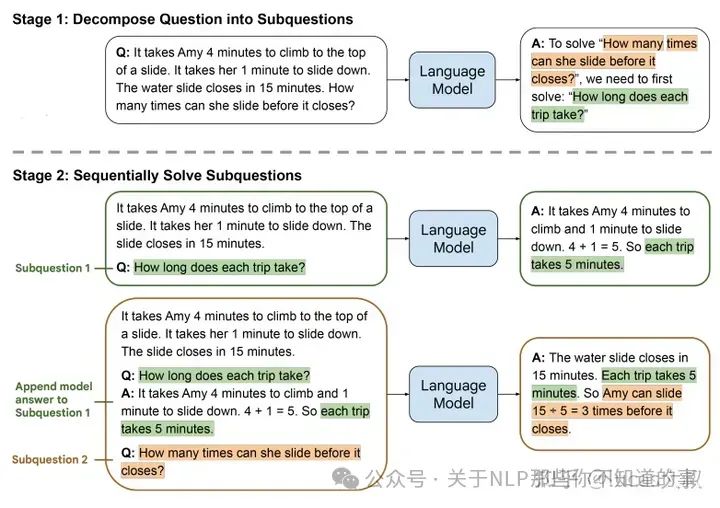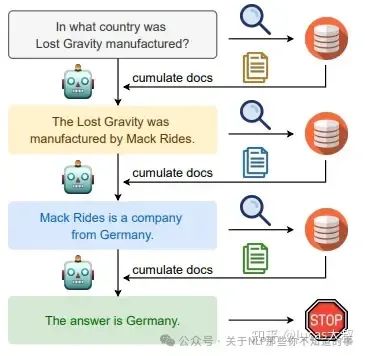从0开始学RAG之Query分解
原文地址:https://zhuanlan.zhihu.com/p/685746861
类型: 技术分享
本文为 @lucas大叔 投稿原创转载!如有侵权,麻烦告知删除!
Query分解是通过将问题分解为子问题来改善问答效果的策略,分两条实现路径:(1)序列求解,将上一个子问题的答案与当前问题一并扔给LLM生成答案,再把当前生成答案与下一个子问题一起给LLM生成答案,直到最后一个子问题生成最终答案;(2)并行的独立回答问题,然后将多路答案合并为最终答案。
下面的示意图很好地诠释了两种技术实现路径的原理。


序列求解的思想来自least-to-most prompting和IRCoT这两篇论文。
在least-to-most prompting中,作者认为CoT提示在自然语言推理任务上表现抢眼,但在解决比给的样例更难的问题时就乏善可陈了。为了解决easy-to-hard泛化问题,大佬们提出了least-to-most prompting。分两步解决问题:首先将复杂问题分解成一系列更容易的子问题,然后依次求解这些子问题,用先前解决的子问题答案助力当前子问题的解决。这两步都是通过few-shot prompting来实现,不需要训练或者微调。

在IRCoT中作者提出了类似的想法,对多步问答在CoT中交错检索,使用检索到的结果改善CoT。

更多技术细节,大家可以参考上述的两篇论文。下面我们转入代码实战环节。
首先写提示模板,将问题分解为若干个子问题。
from langchain.prompts import ChatPromptTemplate# Decompositiontemplate = """You are a helpful assistant that generates multiple sub-questions related to an input question. \nThe goal is to break down the input into a set of sub-problems / sub-questions that can be answers in isolation. \nGenerate multiple search queries related to: {question} \nOutput (3 queries):"""prompt_decomposition = ChatPromptTemplate.from_template(template)
构造分解问题的chain,并将问题分解为几个子问题。
from langchain_openai import ChatOpenAIfrom langchain_core.output_parsers import StrOutputParser# LLMllm = ChatOpenAI(temperature=0)# Chaingenerate_queries_decomposition = ( prompt_decomposition | llm | StrOutputParser() | (lambda x: x.split("\n")))# Runquestion = "What are the main components of an LLM-powered autonomous agent system?"questions = generate_queries_decomposition.invoke({"question":question})
Answer recursively
如上面序列求解流程所示,构建序列回答的prompt模板,基于context和qa对回答问题。
# Prompttemplate = """Here is the question you need to answer:\n --- \n {question} \n --- \nHere is any available background question + answer pairs:\n --- \n {q_a_pairs} \n --- \nHere is additional context relevant to the question:\n --- \n {context} \n --- \nUse the above context and any background question + answer pairs to answer the question: \n {question}"""decomposition_prompt = ChatPromptTemplate.from_template(template)初始化q_a_pairs为空,查询第一个问题时,没有qa对信息。从第二个问题开
始,除了当前的问题,还有前面所有轮的qa对信息,再加上当前问题检索回来的context一起给LLM得到答案。
from operator import itemgetterfrom langchain_core.output_parsers import StrOutputParserdef format_qa_pair(question, answer):"""Format Q and A pair"""formatted_string = ""formatted_string += f"Question: {question}\nAnswer: {answer}\n\n"return formatted_string.strip()# llmllm = ChatOpenAI(model_name="gpt-3.5-turbo", temperature=0)#q_a_pairs = ""for q in questions:rag_chain = ({"context": itemgetter("question") | retriever,"question": itemgetter("question"),"q_a_pairs": itemgetter("q_a_pairs")}| decomposition_prompt| llm| StrOutputParser())answer = rag_chain.invoke({"question":q,"q_a_pairs":q_a_pairs})q_a_pair = format_qa_pair(q,answer)q_a_pairs = q_a_pairs + "\n---\n"+ q_a_pair
Answer individually
相比于序列回答,并行独立回答逻辑简单的多。每个子问题各自调用LLM回答自己的提问,汇总得到的答案。
# Answer each sub-question individuallyfrom langchain import hubfrom langchain_core.prompts import ChatPromptTemplatefrom langchain_core.runnables import RunnablePassthrough, RunnableLambdafrom langchain_core.output_parsers import StrOutputParserfrom langchain_openai import ChatOpenAI# RAG promptprompt_rag = hub.pull("rlm/rag-prompt")def retrieve_and_rag(question,prompt_rag,sub_question_generator_chain):"""RAG on each sub-question"""# Use our decomposition /sub_questions = sub_question_generator_chain.invoke({"question":question})# Initialize a list to hold RAG chain resultsrag_results = []for sub_question in sub_questions:# Retrieve documents for each sub-questionretrieved_docs = retriever.get_relevant_documents(sub_question)# Use retrieved documents and sub-question in RAG chainanswer = (prompt_rag | llm | StrOutputParser()).invoke({"context": retrieved_docs,"question": sub_question})rag_results.append(answer)return rag_results,sub_questions# Wrap the retrieval and RAG process in a RunnableLambda for integration into a chainanswers, questions = retrieve_and_rag(question, prompt_rag, generate_queries_decomposition)
提示模板的指令也简单粗暴,告诉模型这是一组QA对,你用它们来合成原始问题的答案吧!
def format_qa_pairs(questions, answers):"""Format Q and A pairs"""formatted_string = ""for i, (question, answer) in enumerate(zip(questions, answers), start=1):formatted_string += f"Question {i}: {question}\nAnswer {i}: {answer}\n\n"return formatted_string.strip()context = format_qa_pairs(questions, answers)# Prompttemplate = """Here is a set of Q+A pairs:{context}Use these to synthesize an answer to the question: {question}"""prompt = ChatPromptTemplate.from_template(template)final_rag_chain = (prompt| llm| StrOutputParser())final_rag_chain.invoke({"context":context,"question":question})
